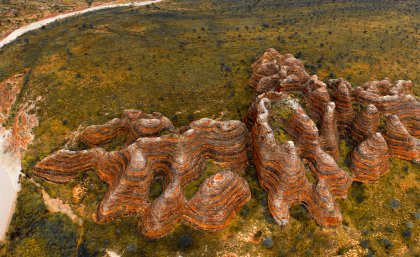
Less than two per cent of wilderness is currently protected in global World Heritage sites - but many opportunities exist to increase this figure.
An international study, led by University of Queensland researchers, urges the UNESCO World Heritage Convention to better conserve wilderness areas within Natural World Heritage Sites (NWHS).
Lead author and UQ School of Earth and Environmental Sciences PhD student James Allan said the study revealed only 1.8 per cent of the world’s wilderness is protected in these sites.
”While some sites like the Okavango Delta in Botswana and Purnululu National Park in Australia both have excellent wilderness coverage, there are broad gaps in wilderness coverage across the globe,” Mr Allan said.
“Our study identifies protected areas within these gaps, for example the Hukaung Valley Tiger Reserve in Myanmar or Eduardo Avaroa Andean Fauna Reserve in Bolivia.
“They have good wilderness coverage and may warrant consideration for World Heritage Status.”
Mr Allan said globally important wilderness areas were increasingly being shown as not only strongholds for endangered biodiversity, but critical in the fight to abate climate change.
They also play a key role in regulating local climates, and supporting many of the world’s most culturally diverse - but politically and economically marginalised - communities.”
“Despite their importance, wilderness areas are being destroyed at an alarming rate and need urgent protection,” Mr Allan said.
“The World Heritage Convention has the ability to do this by improving wilderness coverage within NWHS.”
NWHS, via the formal process run by UNESCO, are globally recognised as containing some of the Earth's most valuable and most threatened natural assets.
Co-author Associate Professor James Watson of UQ and the Wildlife Conservation Society said wilderness conservation had been almost completely ignored in environmental policy.
“There is not just an important opportunity, but an urgent need for a global environmental convention to recognise the importance of conserving wilderness before it is too late,” Dr Watson said.
“The World Heritage Convention can better achieve its own objectives by increasing wilderness coverage within NWHS, which in turn will raise the profile of wilderness conservation globally, and provide wilderness areas with additional protection they need. It is a win-win situation.”
The UNESCO World Heritage Convention will meet in Krakow, Poland from 2-12 July.
The article Gaps and opportunities for the World Heritage Convention to contribute to global wilderness conservation appears in the June 2017 edition of Conservation Biology journal (DOI: 10.1111/cobi.12976).
Media: James Allan (Brisbane, Australia), email j.allan2@uq.edu.au, +61 4249 82651 or Dr James Watson (Brisbane, Australia), email; jwatson@wcs.org, +61 4091 85592.
.jpg)


